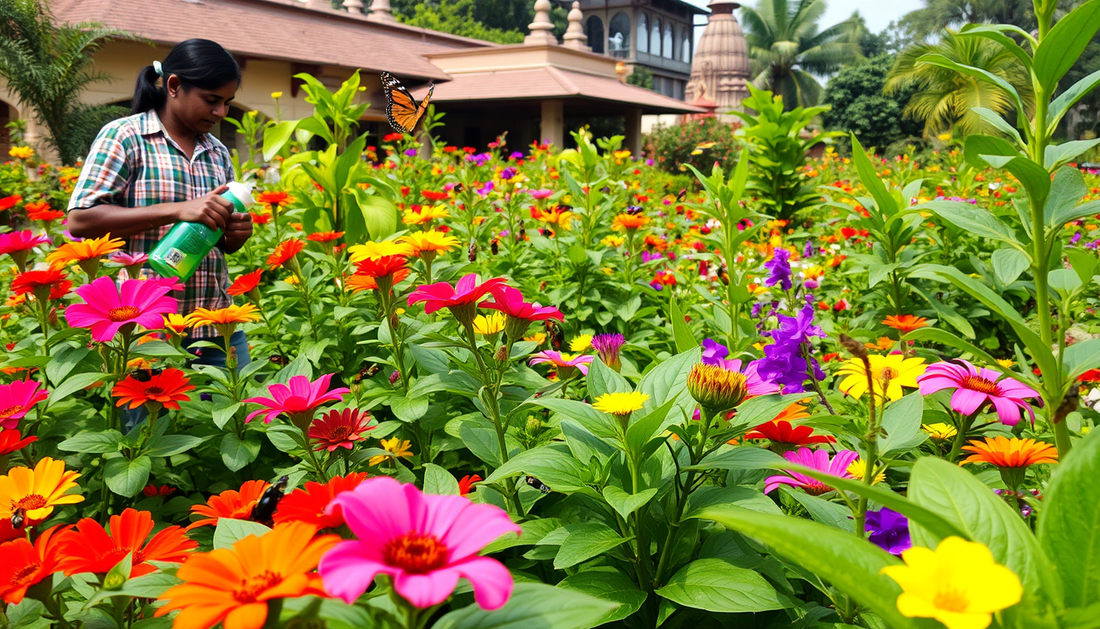
Natural Pest Control Tips for Bangalore Gardens
As a gardener in Bangalore, you know the challenges of maintaining a lush, thriving garden. The hot, humid climate and diverse insect population can make it difficult to keep your plants healthy and pest-free. However, with the right natural pest control strategies, you can create a beautiful, sustainable garden without relying on harsh chemicals.
At Idyl, we're passionate about helping Bangalore gardeners find eco-friendly solutions to common garden pests. Our online shop offers a wide range of organic fertilizers, natural insecticides, and other gardening supplies to help you take control of your garden's health. In this blog post, we'll share our top tips for natural pest control in Bangalore gardens.
Understanding Common Garden Pests in Bangalore
Bangalore's warm, tropical climate is a haven for a variety of garden pests, including aphids, spider mites, thrips, and caterpillars. These insects can quickly infest your plants, causing damage to leaves, flowers, and even the overall health of your garden.
Aphids, for example, are small, sap-sucking insects that can quickly multiply and spread to other plants. They can stunt plant growth, distort leaves, and even transmit plant diseases. Spider mites, on the other hand, are tiny arachnids that spin fine webs on the undersides of leaves, causing them to turn yellow and dry out.
Thrips are another common pest in Bangalore gardens. These slender insects feed on the sap of plants, leaving behind silvery or discolored patches on leaves and flowers. Caterpillars, such as the cabbage looper or the tomato hornworm, can also wreak havoc on your plants by chewing through leaves, stems, and even fruits.
Understanding the specific pests that are common in your Bangalore garden is the first step in developing an effective natural pest control strategy.
Natural Pest Control Strategies for Bangalore Gardens
-
Companion Planting: One of the most effective natural pest control methods is companion planting. By strategically placing certain plants next to each other, you can create a natural barrier against pests and even attract beneficial insects that prey on garden pests.
For example, planting marigolds, nasturtiums, or certain herbs like basil, rosemary, or lavender can help repel aphids, spider mites, and other common garden pests. These plants release natural compounds that deter pests or confuse them, making it harder for them to find and infest your desired plants.
Companion planting can also attract beneficial insects, such as ladybugs, lacewings, and parasitic wasps, which feed on garden pests and help keep their populations in check.
-
Organic Insecticides: While natural pest control methods like companion planting are highly effective, sometimes you may need to use organic insecticides to target specific pest infestations. At Idyl, we offer a range of natural insecticides made from plant-based ingredients, such as neem oil, pyrethrum, or diatomaceous earth.
These organic insecticides work by disrupting the life cycle of pests, either by suffocating them, deterring them from feeding, or interfering with their ability to reproduce. They are generally less toxic to beneficial insects and the environment compared to synthetic pesticides.
When using organic insecticides, be sure to follow the instructions carefully and apply them at the appropriate times to target the specific pests in your garden.
-
Mechanical Removal: Sometimes, the simplest solution to a pest problem is to physically remove the pests from your plants. This can involve hand-picking caterpillars or aphids, using a strong stream of water to dislodge pests, or even using sticky traps to capture and remove them.
Mechanical removal is a great way to address small-scale infestations without the use of chemicals. It's also an effective way to supplement other natural pest control methods, such as companion planting or organic insecticides.
-
Soil Health and Mulching: Maintaining healthy, nutrient-rich soil is essential for creating a thriving garden that is less susceptible to pests. By regularly adding organic matter, such as compost or well-rotted manure, you can improve the soil's structure and fertility, making it more resistant to pests and diseases.
Mulching your garden beds with organic materials, such as wood chips, leaves, or straw, can also help suppress weeds, retain moisture, and create a barrier that makes it harder for pests to access your plants.
-
Crop Rotation and Sanitation: Rotating your crops from year to year and maintaining good garden sanitation can also help prevent pest infestations. By planting different crops in the same area, you can disrupt the life cycles of pests that may have become established in your garden.
Additionally, regularly removing dead or diseased plant material, as well as weeds, can help eliminate potential breeding grounds and hiding spots for garden pests.
Conclusion
By implementing these natural pest control strategies, you can create a thriving, sustainable garden in Bangalore without relying on harsh chemicals. At Idyl, we're committed to helping Bangalore gardeners find eco-friendly solutions to common garden challenges.
Visit our online shop to explore our selection of organic fertilizers, natural insecticides, and other gardening supplies, and let us help you take control of your garden's health. Together, we can create beautiful, pest-free gardens that are in harmony with the local ecosystem.







No comments